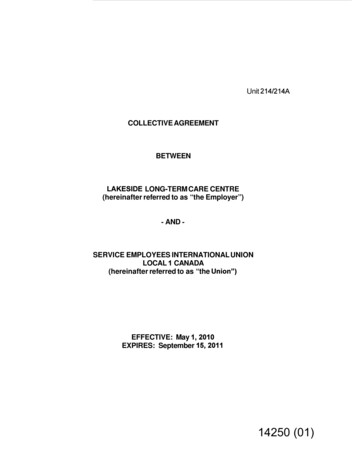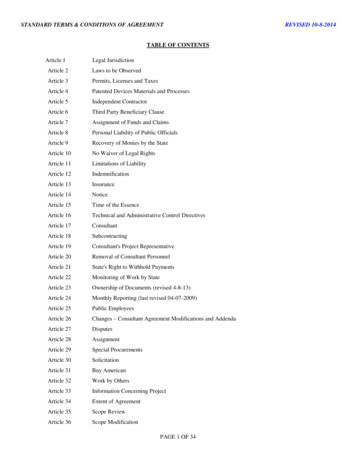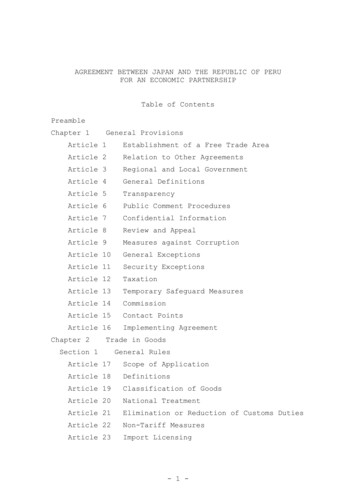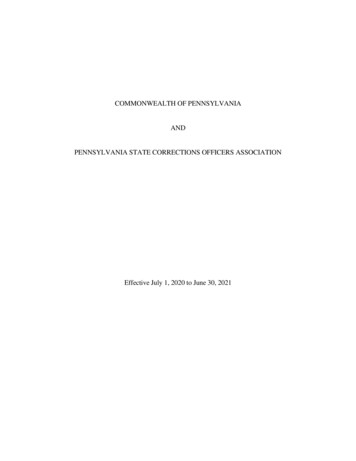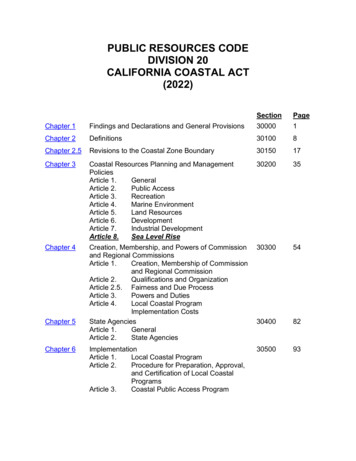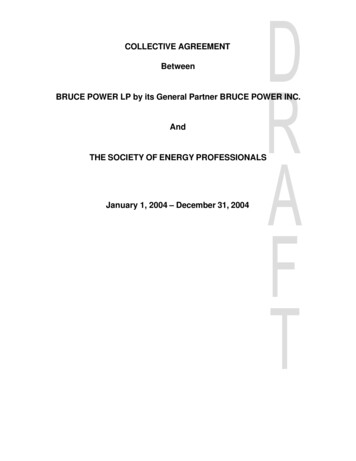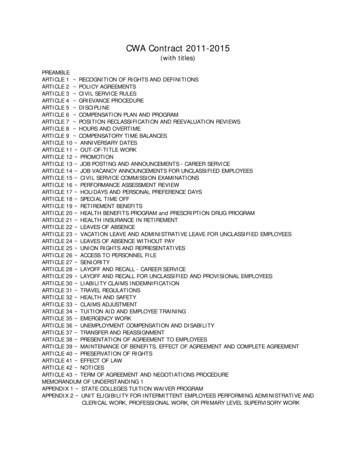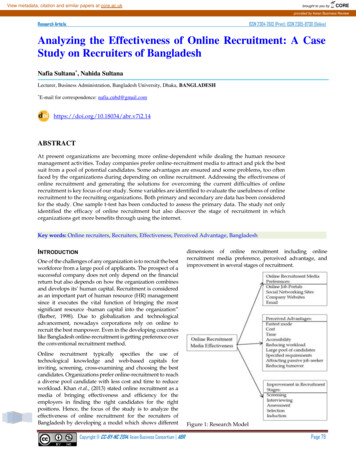
Transcription
View metadata, citation and similar papers at core.ac.ukbrought to you byCOREprovided by Asian Business ReviewResearch Article,ISSN 2304-2613 (Print); ISSN 2305-8730 (Online)Analyzing the Effectiveness of Online Recruitment: A CaseStudy on Recruiters of BangladeshNafia Sultana*, Nahida SultanaLecturer, Business Administration, Bangladesh University, Dhaka, BANGLADESH*E-mailfor correspondence: nafia.cubd@gmail.comReceived: Dec 08, 2017Published: Jan 15, 2018https://doi.org/10.18034/abr.v7i2.14ABSTRACTAt present organizations are becoming more online-dependent while dealing the human resourcemanagement activities. Today companies prefer online-recruitment media to attract and pick the bestsuit from a pool of potential candidates. Some advantages are ensured and some problems, too oftenfaced by the organizations during depending on online recruitment. Addressing the effectiveness ofonline recruitment and generating the solutions for overcoming the current difficulties of onlinerecruitment is key focus of our study. Some variables are identified to evaluate the usefulness of onlinerecruitment to the recruiting organizations. Both primary and secondary are data has been consideredfor the study. One sample t-test has been conducted to assess the primary data. The study not onlyidentified the efficacy of online recruitment but also discover the stage of recruitment in whichorganizations get more benefits through using the internet.Key words: Online recruiters, Recruiters, Effectiveness, Perceived Advantage, BangladeshINTRODUCTIONOne of the challenges of any organization is to recruit the bestworkforce from a large pool of applicants. The prospect of asuccessful company does not only depend on the financialreturn but also depends on how the organization combinesand develops its’ human capital. Recruitment is consideredas an important part of human resource (HR) managementsince it executes the vital function of bringing the mostsignificant resource -human capital into the organization”(Barber, 1998). Due to globalization and technologicaladvancement, nowadays corporations rely on online torecruit the best manpower. Even in the developing countrieslike Bangladesh online-recruitment is getting preference overthe conventional recruitment method.Online recruitment typically specifies the use oftechnological knowledge and web-based capitals forinviting, screening, cross-examining and choosing the bestcandidates. Organizations prefer online-recruitment to reacha diverse pool candidate with less cost and time to reduceworkload. Khan et.al., (2013) stated online recruitment as amedia of bringing effectiveness and efficiency for theemployers in finding the right candidates for the rightpositions. Hence, the focus of the study is to analyze theeffectiveness of online recruitment for the recruiters ofBangladesh by developing a model which shows differentCopyright CC-BY-NC 2014, Asian Business Consortium ABRdimensions of online recruitment including onlinerecruitment media preference, perceived advantage, andimprovement in several stages of recruitment.Figure 1: Research ModelPage 79
Sultana and Sultana: Analyzing the Effectiveness of Online Recruitment: A Case Study on Recruiters of BangladeshObjectives of the studyThe broad purpose of this study is to analyze theeffectiveness of online recruitment to recruiters.Specific purposes of the study are: To identify the preference of online recruitment mediaTo explore the perceived advantages of onlinerecruitmentTo assess the improvement of recruitment processTo find out the problems recruiters face and generatesolutionsResearch implicationThis study will provide the recruiters a view of the full benefitof online recruitment practice in Bangladesh. Before making ajob advertisement, recruiters consider some recruitmentmedia to place the ad. The new business entrants will receivea recommendation from the study about the onlinerecruitment effectiveness in present days of Bangladesh. Therecruiting companies will be able to know what recruitmentprocess has been improved and what hasn’t been. InBangladesh, the most improved stage is screening stage. So,the recruiters can undertake steps for making otherrecruitment stages more improved and efficient.Along with this, when the human resource department willdesire to make new policy for improving the recruitmentstages, this study is supposed to guide them showing whichstage needs to be focused more and what problems aregenerally faced by the employers. Some generatedsolutions may guide the new policy making as well.LimitationsThe study is based on a limited survey where the surveyis conducted on the recruiters of a few industries ofBangladesh. There are many more industries like Banking,Fast Moving Consumer Goods (FMCG) sectors where thepractice of online recruitment is established. Theviewpoints of the recruiters of these industries have beenoverlooked here.LITERATURE REVIEWOrganizations’ investment at the job portal and careercontent on the website can be beneficial in the long run(Khan, Awang & Ghouri, 2013). A significant proportionof recruiting companies adopting online recruitment. Thecompanies are considering the online recruitment as aneffective method in future making a rising trend in its totaluse (Parry & Tyson, 2008). Parry & Tyson (2008) providedinsights into the practice and potential accomplishment ofonline recruitment systems.Harris (2005) described online recruitment approaches:we-find-you approach and you-find-us approach whereinwe-find-us approach, recruiters search for applicants onjob boards and companies’ career websites, and in youfind-us approach, recruiters place job advertisementsPage 80(79-84)enabling job applicants to apply. Online recruitmentprovides the benefit of reaching a wider audience of bothactive as well as passive job applicants. Through we-findyou approach, passive job applicants can easily be found(Carter, 2001 and Haudof & Duncan, 2004).Veger (2006) discussed different methods of onlinerecruitment and their benefits in increasing recruitmentperformance. The process of employment has beenradically changed through internet practiced by small andlarge organizations. Such online recruitment has becomea favored medium of both job applicants, and recruiters asthe internet are providing the job matching services socheaply (Kuhn, 2000). Parry& Wilson (2009) have revealedreasons of a company's decision to practice onlinerecruitment. The factors to adoption of a corporatewebsite and commercial job portals are found different.Human resource managers are less likely to use onlinerecruitment method when they perceive the corporatewebsite use for recruitment negatively (Parry& Wilson,2009). Although Parry& Wilson (2009) found the relativeadvantage of using online recruitment less significant,Arthur (2001) have argued that cost and time saving areusually related to the use of online recruitment. Galanki(2002) identified factors that affect the recruitingorganizations on the decision to recruit through online.Cost-effectiveness and a higher rate of response affectcompanies to recruit through online. Another influencingfactor to their decision includes access to the passive jobapplicants (Galanki, 2002). He also disputed that the leastimportant factors to recruiters include worldwidecoverage and quality of response. The most significantfactor is subjective norms that denote those companieswhere both the employees and employers tend to beonline-centric are more likely to use online recruitment(Parry& Wilson, 2009). Islam (2016) has revealed that theeffectiveness of online recruitment depends on theperformance, reliability, security and cost-effectiveness.Although the internet reaches people from broad geographicaland social contexts over advertising in single provincial ornational newspaper, this also ensures the likelihood to betternotify the job seekers about the job description. The extendedword limit of online job postings enables a company tocommunicate accurate job information with prospectivecontenders letting them self- screening and reducing unfitcandidates (Galanaki, 2002). An advantage of SocialNetworking Sites (SNS) is that they provide the recruiter withan opportunity to attract and approach ‘Passive’ candidates.Passive candidates generate and maintain professional profilelike active job seekers as they suppose that this can bring themcloser to the recruiter although they are not actively seeking fora job (Nikoloau, 2014).One of the most common applications of the internet inHRM activities includes online recruitment and selection.Online advertisement with interactive as well as richmultimedia content can attract the targeted userseffectively. Additionally, screening and testing throughAsian Business Review Volume 7 Number 2/2017
Research Article,ISSN 2304-2613 (Print); ISSN 2305-8730 (Online)internet support an organization in its recruitment efforts(Ngai et al., 2007). Online pre-screening tools facilitate theorganizations to automatically filter out the fitapplications from a large number of applications based onthe self- administered tests. Fully integrated and onlinerecruitment system can reduce the administrativeburdens and simplify the induction process (Barbar, 2006).Among other sources of recruitment, online recruitment isthe most favorite source, and its effectiveness depends onthe advertisement placement. As the internet isextensively used by the job applicants, organizationsshould invest to the establishment of e-recruitmentinfrastructure that is economically sound as compared totraditional approaches (Khan, Awang & Ghouri, 2013).Some papers by different authors have been found aboutthe online recruitment effectiveness. But there isinsufficient study found about the perceived advantagesof online recruitment and improvement in the recruitmentprocess of a developing country like- Bangladesh. This isthe research gap of the study. Through analyzing differentpapers and present perspective recruiters, variables aretaken into consideration. To explore the perceivedadvantage, the variables that are considered includefastest mode, cost, time, accessibility, reducing workload,large pool of candidates, specified requirements,attracting passive job seeker, reducing turnover, andincreasing organizational performance and to assess theimprovement of each stage of recruitment process, the testvariables that are considered include screening,interviewing, assessment, selection, and induction.RESEARCH METHODOLOGYSampling MethodThe convenient random sampling method was applied toselect the respondents. Recruiters of different businessindustries who use online recruitment media for bothposting vacancy advertisement and screening potentialcandidates were selected as the desired sample.Data collection methodA structured questionnaire has been prepared for primarydata collection. There were about 100 questionnaires weresent, and 35 completed questionnaires were returned withthe response rate of 35%. Of them, there are recruitersfrom different business organizations of Bangladesh.Analytical toolThe study is quantitative in manner. The statistical model thatbest fit with the study is one sample t-test as different variablesare identified and analyzed by a specific mean (3) that denotethe agreement of different Likert scale statements.Respondents’ informationThere is the participation of different types of respondentsto validate the data. The respondents were the recruitersor the HR persons who are related to recruitment fromdifferent companies. About 70% of the respondents havemore than ten years’ experience. There were 35respondents from 10 companies, and institutions. Thesample characteristics are presented below:Table 1: Sample InformationName of company1. Robi Axiata LimitedNumber ofrespondents102. Partex Star Group43. University of Dhaka4. BangladeshUniversity5. International Leasing6. and FinancialServices7. Islamic Finance and8. Investment Limited9. Edison3310. ACI311. Edoco Group12. Binary Pi21333Holding position5 Vice-Presidents and5 General Managers2 HR Managers and 2Senior Managers3 Professors1 Professor, 1 Registrarand 1 HR manager1 Executive directorand 2 Senior Managers1 Director and 2 SeniorManagers1 SHR Manager and 2Senior Managers2 Senior executivesand 1 SHR Manager2 HR ManagersCEODATA ANALYSISPreference of online recruitment among recruitersThe recruiters are asked about the preference of differentrecruitment media while recruiting. Following chartshows the result:Chart 1: Preference of Different Recruitment MediaCopyright CC-BY-NC 2014, Asian Business Consortium ABRPage 81
Sultana and Sultana: Analyzing the Effectiveness of Online Recruitment: A Case Study on Recruiters of BangladeshThis is observed that a large proportion (51%) of recruitersprefer social networking sites, about 42% recruiters prefercompany websites and 46% of the recruiters prefer onlinejob portals as recruitment media. Some significantproportion prefers the word of mouth and personalreferrals as effective recruitment media. There is very atrivial percentage that prefers traditional recruitmentmedia.(79-84)The effectiveness of online recruitment has been analyzedin terms following ten factors: fastest mode, cost, time,accessibility, reducing workload, large candidates, fillingspecified requirements, attracting passive job seeker,reducing turnover and increasing organizationalperformance. All factors have been analyzed with testvalue three as each of the questions was Likert- scalequestion.Perceived advantages of online recruitmentTable 2: Advantages of Online Recruitment (One sample t- test)tFastest modeCostTimeAccessibilityReducing workloadLarge pool of candidatesSpecified requirementsAttracting passive job seekerReducing turnoverIncreasing 78113.8996.6557.483.4955.351df Sig. (2-tailed) Mean Difference 95% Confidence Interval of the 4253.9461The significant variables of online recruitmenteffectiveness include fastest mode, cost, time, andaccessibility, reducing workload, reach to largecandidates, filling specified requirements, attractingpassive job seeker and increasing organizationalperformance as the p-value is smaller than .05. Recruitersfind the effectiveness of online recruitment mostlyregarding cost saving, followed by accessibility, largecandidates and time-saving. Least significant factors areattracting passive job seekers, and increasingorganizational performance. The insignificant factor isreducing turnover (t .273 [df 26], p .05).Improvement of recruitment processThere are five stages of the recruitment process identified includingscreening, interviewing, assessment, selection, and induction. Therespondents have been asked five Likert-scale questions about theimprovement in different recruitment processes. Data has beenanalyzed with one sample t-test with test value 3.This is observed that; on average, the recruitment processes thathave been improved through online recruitment includescreening, interviewing and assessment as their P-value issmaller than .05. Screening is found to be improved most,followed by assessment and interviewing. Selection andinduction (t 1.308 [df 26], p .05 and (t .493 [df 26], p .05respectively) are not improved by online recruitment system.Table 3: Improvement in each Recruitment Stages (One sample t- test)tdfSig. (2-ailed)Mean 3.002.661.831DISCUSSIONGraphical illustration revealed a generic perception ofrecruiters about the recruitment media preference. It isseen that online recruitment media – Online Job Portals,Company Websites, Social Networking Sites, and Emailsare most preferred among the recruiters. Veryinsignificant percentage of recruiters thinks thatPage 821.22857.37143.45714.05714.0285795% Confidence Interval of the 7-.2056.3199-.2412.2984traditional media, word-of-mouth and referrals can beconsidered as the effective mean of recruitment.Speed, cost, time, accessibility, reducing workload,reaching to a large pool of candidates, meeting specifiedrequirements, attracting passive job seeker and increasingorganizational performance have been found significantfactors that provide advantages to employers. TheAsian Business Review Volume 7 Number 2/2017
Research Article,ISSN 2304-2613 (Print); ISSN 2305-8730 (Online)effectiveness of online recruitment is found mostlyregarding cost saving, followed by accessibility, reachingto large candidates and time-saving. It is also noticeablethat the recruitment stage improved most by online isscreening followed by assessment, and interviewing.Many more problems are identified by the recruiters andcertain solutions have been generated accordingly.Summary of findingsFigure 2: Results of the studySuggestions by respondentsThe respondents were asked to identify what recruitmentmedia they prefer for urgent recruitment. A very fewrespondents opined that online recruitment is the best.Most of the respondents think that using online recruitmentmedia is okay for the time being, but it needs to beimproved. Many respondents argue that there is lack ofpersonal interaction while using online recruitment media.The problem that is stated most by the respondents is theapplicants often do not provide authentic information.Again, the respondents feel that online recruitment takesmuch time to pick the best candidates for interview from abroad pool of applicants. Sometimes candidates apply forpositions that do not suit their qualifications which maylead to consumption of time of the recruiters.The respondents suggested a few ways to overcome theproblems. They think there should be an automatedfiltration tool to screen the application without much timeand effort. Some also suggest introducing Skype interviewto advance all stages of recruitment.RECOMMENDATIONSSome recommendations have been proposed afteranalyzing the fact and findings here: The online recruitment media should advance theirtools by providing some auto-filtration techniques sothat perfect candidates can be chosen quickly and easily.The organizations should practice the use of onlinerecruitment in all stages of recruitment process.There should be a clear feedback system between therecruiters and applicants while using online media ofrecruitment.Copyright CC-BY-NC 2014, Asian Business Consortium ABRCONCLUSIONMany of the organizations are becoming online-centricday by day. So, this is necessary for the new entrants tounderstand the effectiveness of online recruitmentregarding different dimensions. The study focused onshowing the effectiveness of online recruitment in termsof preference of different media among employers,perceived advantages as well as improvement in differentrecruitment stages. This is observed that very insignificantnumber of recruiters prefer traditional media, word ofmouth and referrals for employee recruitment. Theperceived advantage analysis showed that onlinerecruitment is effective regarding speed, cost, time, andaccessibility, reducing workload, reaching to a large poolof candidates, meeting specified requirements, attractingpassive job seeker and increasing organizationalperformance. Another finding presented that therecruitment has been improved most in the screeningstage. So, the organizations should be concerned abouthow they can utilize the benefits of online recruitment inother stages of the recruitment process to make therecruitment process easy, flexible and convenient. Theyshould undertake proper steps to solve the facedproblems in recruitment process.In future, researchers can further work on proposing asystem to accelerate the online recruitment effectivenessin other recruitment stages, and to do investigate whetheronline recruitment is filling the gap between recruitersand job seekers.REFERENCESArthur, D. (2001). The employee recruitment and retention handbook.New York: AMACOM Div American Mgmt Assn.Awang, M. G. (2013). Impact of E-Recruitment and Job-SeekersPerception on Intention to Pursue the Jobs. Management &Marketing - Craiova , Vol. 11, pp. 47-57.Barber, L. (2006). E-recruitment Developments. Brighton: Brighton:Institute for Employment Studies.Cober, R. T. (2004). Recruitment on the Net: How DoOrganizational Web Site Characteristics Influence ApplicantAttraction? Journal of Management , Vol. 30, pp. 623-646.Galanaki, E. (2002). The decision to recruit online: a descriptivestudy. Career Development International , Vol. 7, pp. 243-251.Hausdorf, P. A. (2004). Firm Size and Internet Recruiting inCanada: A Preliminary Investigation. Journal of SmallBusiness Management , Vol. 42, pp. 325-334.Islam, M. M. (2016). Analysis of E-recruitment Trend andEffectiveness:. Business Management , Vol. 30 pp. 1-2.Kuhn, P. (2000). Policies for an internet labour market. PolicyOptions-Montreal , Vol.21, pp.42-47.Ngai, E. L. (2007). Importance of the internet to human resourcepractitioners in Hong Kong. Personnel Review , 37(1), pp.66-84.Nikolaou, I. (2014). Social networking web sites in job search andemployee recruitment. International Journal of Selection andAssessment , Vol. 22, pp.179-189.Page 83
Sultana and Sultana: Analyzing the Effectiveness of Online Recruitment: A Case Study on Recruiters of Bangladesh(79-84)Parry, E. &. Tyson, S. (2008). An analysis of the use and successof online recruitment methods in the UK. Human ResourceManagement Journal , Vol. 18, pp. 257-274.Veger, M. (2006). How does Internet recruitment have effect onrecruitment performance? In Fourth Twente StudentConference on IT , Vol. 30.Parry, E. &. Wilson, H. (2009). Factors influencing the adoptionof online recruitment. Personnel Review , Vol. 38, pp.655-673.--0--Online Archive: Page 84Asian Business Review Volume 7 Number 2/2017
Sultana and Sultana: Analyzing the Effectiveness of Online Recruitment: A Case Study on Recruiters of Bangladesh (79-84)


